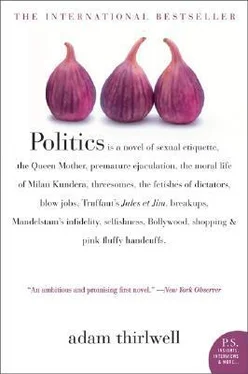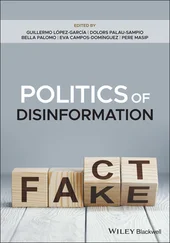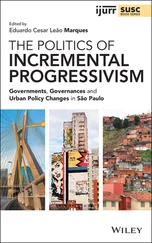Adam Thirlwell - Politics
Здесь есть возможность читать онлайн «Adam Thirlwell - Politics» весь текст электронной книги совершенно бесплатно (целиком полную версию без сокращений). В некоторых случаях можно слушать аудио, скачать через торрент в формате fb2 и присутствует краткое содержание. Год выпуска: 2004, Издательство: Harper Perennial, Жанр: Современная проза, на английском языке. Описание произведения, (предисловие) а так же отзывы посетителей доступны на портале библиотеки ЛибКат.
- Название:Politics
- Автор:
- Издательство:Harper Perennial
- Жанр:
- Год:2004
- ISBN:нет данных
- Рейтинг книги:3 / 5. Голосов: 1
-
Избранное:Добавить в избранное
- Отзывы:
-
Ваша оценка:
- 60
- 1
- 2
- 3
- 4
- 5
Politics: краткое содержание, описание и аннотация
Предлагаем к чтению аннотацию, описание, краткое содержание или предисловие (зависит от того, что написал сам автор книги «Politics»). Если вы не нашли необходимую информацию о книге — напишите в комментариях, мы постараемся отыскать её.
Moshe loves Nana. But love can be difficult — especially if you want to be kind. And Moshe and Nana want to be kind to someone else.
They want to be kind to their best friend, Anjali.
Politics
Politics — читать онлайн бесплатно полную книгу (весь текст) целиком
Ниже представлен текст книги, разбитый по страницам. Система сохранения места последней прочитанной страницы, позволяет с удобством читать онлайн бесплатно книгу «Politics», без необходимости каждый раз заново искать на чём Вы остановились. Поставьте закладку, и сможете в любой момент перейти на страницу, на которой закончили чтение.
Интервал:
Закладка:
Raymond QueneauThe preliminary act: maximum twenty minutes. Two: less than a minute.
Yves TanguyOne: two hours. Two: two minutes. Pierre UnikOne: one hour. Two: between fifteen and forty seconds.
Andre BretonAnd the second time? Accepting that one makes love in the shortest possible time? Me? Three to five minutes for the sexual act.
Benjamin PeretThe sexual act: around a quarter of an hour.
Yves TanguyTen minutes.
Marcel DuhamelI’m the same.
Pierre UnikIt varies: between two and five minutes. Raymond QueneauA quarter of an hour.
Jacques PrevertThree minutes or even twenty minutes. What do you think of a woman with a shaved sex?
Andre BretonVery beautiful, infinitely better. I have never seen it, but it must be magnificent.
12
I really do not think that Moshe needed to be so flustered by his performance. Andre Breton, the founder of the Surrealist movement, came in twenty seconds maximum. Raymond Queneau, a novelist, the author of Zazie in the Metro, would last less than a minute.
Whereas Moshe had come after six minutes and forty- seven seconds. In comparison with Andre Breton and Raymond Queneau he was a superman. He may only have been half Jewish, it may even have been the wrong half, but he still belonged to the chosen people.
And it was not just his sexual capacity that was remarkable. He was also a connoisseur of the ‘shaved sex’. Yes, Moshe had seen a hairless vagina. When he was seventeen, as a birthday favour to Moshe, his first ever girlfriend, called Jade, removed all her pubic hair. She did this using a sensibly smeared layer of Immac Sensitive. She took him into the girls’ toilet at the Fridge in Brixton, and put his hand down her trousers so that Moshe could feel her babyish smoothness and incontinent wetness.
Moshe was a sexual virtuoso. Moshe was a talent.
13
But I am worried we are ignoring Papa. And I am not going to ignore Papa. Now that Moshe and Nana have finally had sex, we can ignore them for a moment instead.
While his daughter was being satisfied by an unorthodox Jewish boy, Papa was having a suit adjusted. As it happened, he was having his suit adjusted by an Orthodox Jewish man.
Life is full of such ironies and coincidences.
Mr Blumenthal was Papa’s tailor. He was a short and oblong seventy-five-year-old. He had no hair. He wore cardigans. He lived on the corner of Shakespeare Close and Milton Road, by the synagogue, in Hatch End. On the A-to-Z map of Greater London the synagogue was represented by a Star of David. He lived with his wife who was called Mrs Blumenthal. Mrs Blumenthal was a short square woman. She had a lot of hair. She did not wear cardigans.
In their mock-Tudor house on the corner of Shakespeare Close and Milton Road, it was Sunday morning, and Papa was having the trousers taken up and the shoulders taken in.
Mr Blumenthal was kneeling down in Mr and Mrs Blumenthal’s living room, bent over Papa’s heather-mix socks, with a row of pins in his mouth. He was complimenting Papa on having an eye for such high-quality cloth. At the same time he was criticising the makers of the suit for the inept stitching of the seams.
Papa looked at the coffee-table book of Israeli photographic landscapes. He looked at the red padded frame, embroidered with swirls of gold thread, that surrounded a photograph of a boy in his garish bar-mitzvah shawl.
And what was Papa thinking about? As usual, Papa was trying not to think about Auschwitz.
Auschwitz?
This was not because he was sinister. No no. It was because he was kindly.
Papa had been to Auschwitz. On business in Cracow, he had made the journey to Auschwitz with a tour party of Israeli boys and girls. When Papa was there, Auschwitz was sunny and clean. The grass was cut. Three Japanese tourists posed for the camera beneath the gate’s welded inscription
- ‘Arbeit Macht Frei’. A cleaner polished the glass of the cases which held luggage, children’s clothes, hair. There were tonnes of hair. The Nazis had made hair heavy. And this, thought Papa, was an achievement. It was an achievement — making everything abnormal.
But, actually, everything was not abnormal. That was Papa’s main sadness at Auschwitz. It would have been better, he thought, if it was. Instead, all the objects were just the right size. They were just like ordinary objects.
There was a plait which would brush a girl’s shoulder if she turned. It would catch on the side of her neck. Everything was in proportion.
Really Papa should not have gone to Auschwitz. It only depressed him. It destroyed him. Because the thing about kindly people is that they are amazed by aggression. And this makes them so upset that they want to find out why. How, they say, how is it possible that people can be so cruel?
Papa just wanted to understand.
He had once got the brochure for the Holocaust holiday, organised by Midas Battlefield Tours, but had been too horrified by the wording. ‘Day 3. This morning we drive out to the Death Camps of Treblinka, where up to 17,000 victims were murdered daily. Returning to Warsaw for the afternoon, we stroll through the pleasant and peaceful Lazienki Park, maybe to the strains of Chopin, and visit the Palace upon the Water. Return to our hotel for dinner.’
Papa was not crass. He was not ghoulish. He was just an innocent.
In his attempt to understand the nature of evil, Papa’s bedtime reading at one time was Commandant of Auschwitz by Rudolf Hoess, with a blurb by Primo Levi. Primo was no PR supremo. This was his blurb to Rudolf Hoess: ‘This book is filled with evil. it has no literary quality and reading it is agony.’
Rudolf Hoess bewildered Papa.
Rudolf just wanted to be a farmer. He wanted a pleasant career with a silo and machines. And he ended up running Auschwitz. If Rudolf had been contemporary, his dearest wish would have been to sit down with a cup of Lipton’s Earl Grey and a HobNob, discussing the evils of Brussels bureaucrats in his MFI kitchen. He would have wanted the quiet life. The nearest Rudolf would have got to violence would have been the slaughter of a pig outside the Moreton- in-Marsh Budgens, in protest at French malpractice and misfeasance.
But no. He ran Auschwitz.
‘What was Auschwitz like?’ said Mr Blumenthal once, repeating Papa’s innocent question. Mr Blumenthal looked across at Mrs Blumenthal. Papa and Mr Blumenthal observed the fat feet of Mrs Blumenthal wrapped in blue tights on her dark velvet electric recliner. ‘What was it like?’ said Mr Blumenthal. And what could he say? ‘The food was bad,’ he said. ‘The food was terrible.’
Papa had not really known if this was funny. He had not quite managed a laugh. He had wanted to laugh and he got as far as the giggle. But a giggle is not a laugh.
‘You,’ said Mrs Blumenthal. ‘One of these days you will get yourself into trouble with this talk.’ ‘What sort of trouble?’ said Mr Blumenthal. ‘Trouble,’ said Mrs Blumenthal.
Papa liked Mr and Mrs Blumenthal. He liked them a lot. It just made him unhappy that when Mr Blumenthal knelt down in a white vest to push pins into his hem, Papa could see, in amongst the freckles on his wrist, a bluish tattooed five-digit number.
Perhaps you understand the importance of the number five here, but maybe you do not. Five digits meant that Mr Blumenthal was an early arrival at Auschwitz. He was only in the tens of thousands. He had longer to get through than most.
But something else made Papa unhappy too. It was not just the number. It was this. ‘There is a schvartze next door now,’ said Mrs Blumenthal. ‘Oh really?’ said Papa. ‘Yes a schvartze,’ said Mrs Blumenthal. ‘That must be nice,’ said Papa. ‘Nice?’ said Mr Blumenthal. ‘A schvartze next door to a synagogue! Some meshuggener family next to shul? Of course it is not nice!’
Читать дальшеИнтервал:
Закладка:
Похожие книги на «Politics»
Представляем Вашему вниманию похожие книги на «Politics» списком для выбора. Мы отобрали схожую по названию и смыслу литературу в надежде предоставить читателям больше вариантов отыскать новые, интересные, ещё непрочитанные произведения.
Обсуждение, отзывы о книге «Politics» и просто собственные мнения читателей. Оставьте ваши комментарии, напишите, что Вы думаете о произведении, его смысле или главных героях. Укажите что конкретно понравилось, а что нет, и почему Вы так считаете.












